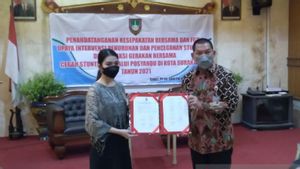JAKARTA - Head of the National Population and Family Planning Agency (BKKBN) Hasto Wardoyo said the problem of stunting is the biggest obstacle in maintaining the quality of children towards the golden generation of 2045 in Indonesia.
Stunting is a condition in which children do not grow according to their age. In children who are stunted, brain cells do not develop optimally. So it affects intelligence so that there are those who think late or are less intelligent.
"The proportion of disturbances to the quality of human resources like this, real and concrete, the biggest is stunting with 27.6 percent. Followed by the next disorder is mental-emotional disorder," said Hasto at the 2021 National Symposium virtually, Tuesday, October 26.
Based on the proportion, the stunting rate in Indonesia is the biggest disturbance, which is 27.6 percent. The next biggest disorders are mental disorders at 9.8 percent, autism at 4.1 percent, narcotics addicts at 5.1 percent, and people with mental disorders (ODGJ) which cover 7 out of 1.000 people.
Therefore, currently, the BKKBN is intensifying the stunting rate reduction program. Because, according to Hasto, if the stunting problem in Indonesia can be eradicated, then the disruption in the quality of human resources towards the 2045 golden generation can subside.
SEE ALSO:
Moreover, President Joko Widodo has set a target that the stunting rate in 2014 could drop to 14 percent, from the current prevalence of 27.6 percent.
"Of all these (disorders) when we take stunting, the largest proportion is easily overcome," said Hasto.
Therefore, currently, the BKKBN is collaborating with a number of universities in reducing stunting rates in Indonesia. This collaboration is contained in the Merdeka Campus program, where students run lectures of 20 credits with the theme of stunting.
A number of stunting management programs that can be carried out by students through the Merdeka Campus activities are to build villages and humanitarian projects. In addition, students can also do community service and thematic Community Service Program (KKN).
"There were 11 universities at the beginning that had joined the stunting eradication. Hopefully, there will be 4.600 universities so that all villages can be touched with stunting alleviation assistance students," said Hasto.
In its implementation, university students can help strengthen village government stunting management planning and budgeting, then improve the quality of implementation of activities as well as increase the capacity of human resources.
In addition, the community can provide coaching and mentoring, and advocacy to the village government, as well as problems related to stunting handling data.
The English, Chinese, Japanese, Arabic, and French versions are automatically generated by the AI. So there may still be inaccuracies in translating, please always see Indonesian as our main language. (system supported by DigitalSiber.id)

















